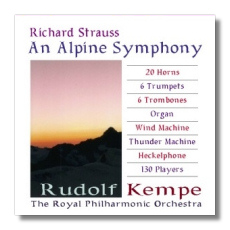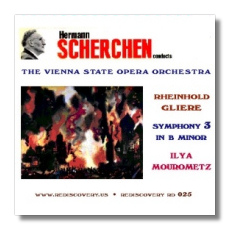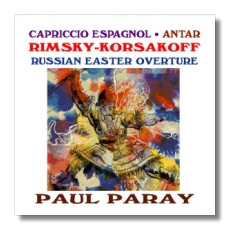
The Internet's Premier Classical Music Source
Related Links
-
Glière Reviews
Rimsky-Korsakoff Reviews
Strauss Reviews - Latest Reviews
- More Reviews
-
By Composer
-
Collections
DVD & Blu-ray
Books
Concert Reviews
Articles/Interviews
Software
Audio
Search Amazon
Recommended Links
Site News
 CD Review
CD Review
ReDiscovery

Richard Strauss
- Eine Alpensinfonie
- Till Eulenspiegel's lustige Streiche
Royal Philharmonic Orchestra/Rudolf Kempe
Bologna Community Theater Orchestra/Arturo Basile
ReDiscovery RD069 ADD 64:43


Reinhold Glière
- Symphony #3 in B minor "Ilya Muromets", Op. 42
Vienna State Opera Orchestra/Hermann Scherchen
ReDiscovery RD025 ADD monaural 79:55


Nicolai Rimsky-Korsakoff
- Capricico espagñole
- Symphony #2 "Antar"
- Russian Easter Overture
Detroit Symphony Orchestra/Paul Paray
ReDiscovery RD022 ADD monaural 55:08
For the most part, the major labels have given up reissuing older recordings; now they just recycle and repackage them over and over again. Apparently they believe that the serious market for recordings made prior to 1970 has either dried up or died off. Many conductors' recorded legacies – Paray's and Scherchen's among them – have been left to languish.
However, as remastering and CD-burning technology trickles down towards the masses, starting a "record company" of sorts is within the reach of a few dedicated individuals. ReDiscovery is just such a record company. Citing the "homogenized" quality of modern classical musicianship, ReDiscovery claims to be playing an "educational" role in bringing treasured but unreissued recordings from the 60s and 70s back into circulation. The label obtains open-reel tapes (or very good quality LP pressings) of classical recordings some might consider "caviare for the general." Although these recordings have not been licensed from the original owners, this is all perfectly legal, we are told, given the intricacies of copyright law concerning classical recordings issued prior to 1972. These recordings have been digitally remastered and carefully transferred to CDRs. These CDRs may be purchased from the ReDiscovery website: www.rediscovery.us. All three discs reviewed here cost $15, and that includes shipping and handling. Production values are basic. These are blank-label CDRs; the catalog number has been handwritten near the disc's center hole. There's a cover page with perfunctory artwork (there is no booklet, per se) and an inlay card with track listings and a few brief paragraphs of notes concerning the performance and the recordings. Reviews of three ReDiscovery releases follow.
Is it only a mountain? Richard Strauss's Eine Alpensinfonie encourages the listener to ask this philosophical question. The music is almost pictorial in its description of a climber's ascent – and rapid descent, as a consequence of a vicious storm – of a mountain in the German Alps. Was the climber Strauss? And might this mountain be a symbol for something else? Artistic achievement possibly, or even life itself?
Conductors who wish to avoid bombast in this noisy score do well to look below its surface and to focus on its latent symbolism. Kempe, one of the great Strauss conductors of the 1960s and 70s, balances spectacle with thoughtfulness. The cover brags of "20 Horns, 6 Trumpets, 6 Trombones, Organ, Wind Machine, Thunder Machine, Heckelphone, and 130 Players" but the question is this: does Kempe go to the music's heart in this recording? The answer is yes.
Rudolf Kempe probably needs no introduction. His best known recording of Eine Alpensinfonie was made for EMI in the 1970s with the Dresden State Symphony Orchestra. The present recording was made for RCA Victor, in the early years of the stereophonic era. While the Dresden reading has a burnished, mellow quality, the present one is vivid and immediate – far more viscerally exciting. It also has better sound, some odd balances notwithstanding. (The cow bells will have you checking behind the sofa for manure piles.) Furthermore, while the Dresden players bring an authentic middle-European sound to this score, the Royal Philharmonic is better equipped to pump out the music's requisite volume and energy. The RCA Victor LP is a favorite of collectors. Now here's an opportunity to hear it in a loving CD remastering. (Here, the work is divided into four tracks with internal access points – a possible disadvantage for some.)
The CD opens with a very interesting performance of Till Eulenspiegel. The names of the performers might suggest that this is a provincial reading, and for sure, refined execution is not what makes this recording worthwhile. (I've seen Basile's name on a few operatic recital discs, and I don't think I've heard the Bologna ensemble anywhere until now.) Basile understands the score and takes his time with it, and he brings out more detail than usual. The Bolognese play with a quality in short supply these days: personality. OK, this is not a perfect Till Eulenspiegel, but it's a mightily entertaining one! I wish ReDiscovery had identified this recording's source and date.
Hermann Scherchen was the first conductor to record Glière's monumental Third Symphony without any cuts whatsoever. (Some recordings cut nearly half the score.) That October 1952 recording, originally on the Westminster label, has been reissued here, using nearly flawless copies of the original two-LP set as source material. (And flawless copies are hard to find, particularly because later pressings were plagued by everything from distortion to pitch variability.) My only complaint is that the pauses between movements are very short, probably a necessity, given the length of the program.
Although Berlin-born, Scherchen (1891-1966) had a particular affinity for Russian music. (His Westminster recordings of Tchaikovsky's "1812" Overture and Rimsky-Korsakoff's Schéhérazade recently were reissued by Universal Classics.) He also excelled in modern music. For example, he assisted Arnold Schoenberg at the 1912 première of Pierrot Lunaire. Ilya Muromets, oddly enough, also was written in 1912, and you can't get more retrograde (and more Russian) than this score! Glière lived until 1956, and he kept on composing almost as if the Russian Revolution had never happened, although his music generally won approval from the Soviet authorities.
Since 1952, there have been a few notable (Downes, Johanos) and less notable (Farberman) recordings of Glière's complete score. As it is monaural, Scherchen's recording will be out of the running for audiophiles, and perfectionists will click their tongues at the several glaring imperfections in the execution of the Vienna State Opera Orchestra. Still, Scherchen goads the group (sometimes vocally!) into making sounds that are delirious, if not the most refined, and there's not a trace of embarrassment over Glière's late-Romantic excesses. (Think of an orchestral orgy presided over by Poem of Ecstasy -era Scriabin and Tristan und Isolde -era Wagner.) Scherchen knows how to get the most color out of Glière's garish effects, and he paces the score so its 80 minutes seldom seem overlong. This reissue will bring back plenty of memories for many listeners. In fact, my first exposure to Ilya Muromets (in the early 1970s) was courtesy of the Scherchen LPs.
Paul Paray's stereo recordings are well represented in Universal Classics' Mercury Living Presence CD reissue series – now apparently at an end. At the same time, his monaural recordings have been almost completely ignored. This Rimsky-Korsakoff program was recorded by Mercury in 1953, a year after Paray become the Detroit Symphony Orchestra's music director.
Paray, a Frenchman, has become typecast as an expert conductor in the French repertoire – a sort of Charles Munch for the Motor City. He was born in Normandy in 1886, and made his debut as a conductor as late as 1920. Until World War Two, he conducted in and around Paris, and when the Germans came, he remained defiant, refusing to identify Jewish musicians for the Nazi invaders. When he accepted a conducting post in Monte Carlo, he took Jewish musicians with him to spare them from probable persecution and death. After the war, he returned to Paris, and also visited the United States. It was his 1951 visit to Detroit that encouraged the orchestra's management to offer him a full-time post the following year. The Detroit Symphony Orchestra had fallen on difficult times, and the management rightly identified Paray as the sort of conductor who could bring them back to a world-class standard.
This ReDiscovery reissue reminds us that Paray also excelled in the Russian repertoire. These performances are notable for their zest and also for their textural clarity. Paray was a master of orchestral balance. Recording companies have long had the option of adjusting the prominence of individual orchestral parts with the aid of multiple microphones and a mixing board. Paray didn't need any mechanical assistance; he did it all on his own. The Capriccio espagñol starts off a bit too driven for my tastes, but Paray's bold tempos eventually blew my reservations away. (Check out his idiosyncratic "hesitant" phrasing in the middle of the piece.) "Antar" is Old Russia personified: dark, sensuous, folksy, and fantastic. Paray's Russian Easter Overture mixes solemnity and manic joy. I'm not sure these are my favorite recordings of the two shorter works, but they definitely deserved to be rescued from obscurity. The sound is very dry, but brilliant in its own way.
Copyright © 2003, Raymond Tuttle












